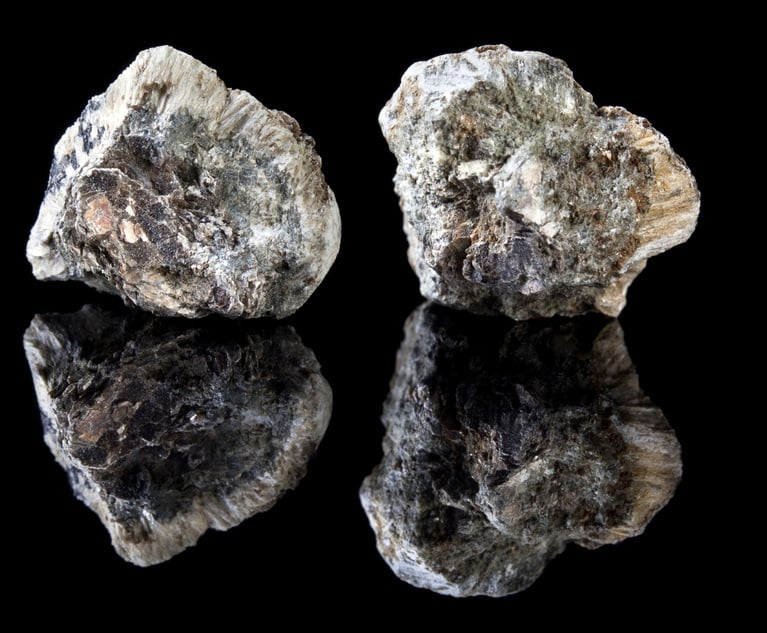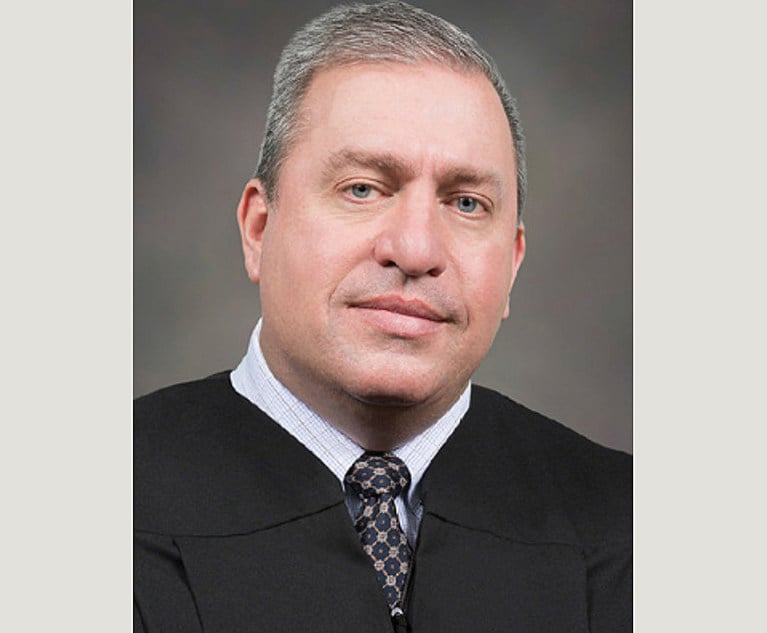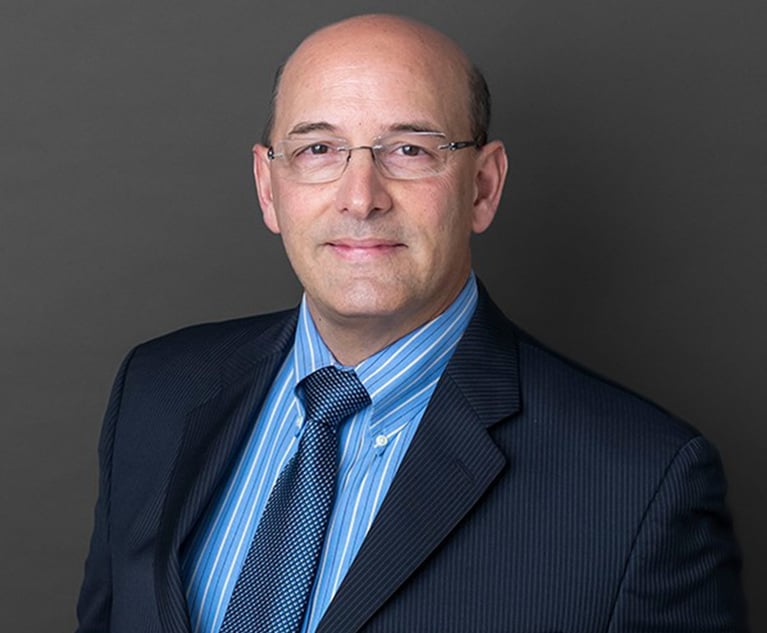Phila. Judge Limits New Discovery in Pelvic Mesh Jurisdiction Dispute
The judge overseeing the pelvic mesh mass tort in Philadelphia has agreed to let the plaintiffs perform limited additional depositions related to a jurisdictional dispute that recently reignited in the wake of the U.S. Supreme Court's ruling in Bristol-Myers Squibb v. Superior Court of California.
October 16, 2017 at 05:56 PM
3 minute read

The judge overseeing the pelvic mesh mass tort in Philadelphia has agreed to let the plaintiffs perform limited additional depositions related to a jurisdictional dispute that recently reignited in the wake of the U.S. Supreme Court's ruling in Bristol-Myers Squibb v. Superior Court of California.
Philadelphia Court of Common Pleas Judge Arnold New on Oct. 13 granted defendant Ethicon's motion for a protective order that sought to block the plaintiffs from taking additional depositions about the mesh-maker's relationship with one of its materials suppliers. The ruling, however, also allowed the plaintiffs to depose both a corporate designee and the strategic sourcing manager for Ethicon, which is facing more than 100 pelvic mesh cases in Pennsylvania state court.
Shanin Specter of Kline & Specter, who is representing the plaintiffs, said in an emailed statement he was pleased with New's ruling.
“We're glad Judge New ordered the depositions to go forward,” Specter said. “To paraphrase Joe Louis, Johnson & Johnson 'can run but they can't hide.'”
The discovery dispute stems from arguments over how the decision in Bristol-Myers Squibb should affect the pelvic mesh mass tort program in Philadelphia. That Supreme Court ruling, which some have referred to as a “game-changing” decision for state court mass tort programs, made clear that out-of-state plaintiffs can't sue companies where the defendants aren't considered to be “at home,” or haven't conducted business directly linked to the claimed injury.
Ethicon, which is based in New Jersey, has argued that Bristol-Myers Squibb means 90 cases that were filed in Philadelphia court by out-of-state plaintiffs should be tossed, which would leave 30 cases pending in the state court program.
The plaintiffs, however, have pointed to the fact that biomaterials supplier Secant, which is located in Bucks County, manufactured the plastic mesh materials used in the mesh implants, and contend that this relationship is significant enough for Pennsylvania courts to have jurisdiction over the mass tort.
Earlier this month, Ethicon cried foul after the plaintiffs issued deposition notices aimed at gathering additional information about the relationship between Ethicon and Secant. The notices had been issued after New called for additional briefing to specifically address the extent to which Secant is the exclusive provider of Ethicon's pelvic mesh devices, and, if Ethicon uses other mesh providers, whether it is possible to determine if a particular device contains materials provided by Secant.
Ethicon had argued that, along with being filed too late, the notices constituted unreasonable annoyance and harassment and imposed an undue burden for the company.
“They are completely unnecessary, too, because defendants, as well as Secant, have already provided thousands of pages of discovery on these topics,” Ethicon said in a brief filed Sept. 29 by Drinker Biddle & Reath attorney Melissa Merk.
In a response to Ethicon's motion to quash, Kline & Specter attorney Lee Balefsky wrote that there is, in fact, enough documentation to support the plaintiffs' contention that Secant provided the materials to Ethicon, but that affidavits between Secant and Ethicon employees would provide more insight into the relationship between the two companies and the manufacturer of the mesh.
A spokeswoman for Ethicon, which is a J&J subsidiary, did not return a message for comment prior to the publication deadline.
Max Mitchell can be contacted at 215-557-2354 or [email protected]. Follow him on Twitter @MMitchellTLI.
This content has been archived. It is available through our partners, LexisNexis® and Bloomberg Law.
To view this content, please continue to their sites.
Not a Lexis Subscriber?
Subscribe Now
Not a Bloomberg Law Subscriber?
Subscribe Now
NOT FOR REPRINT
© 2024 ALM Global, LLC, All Rights Reserved. Request academic re-use from www.copyright.com. All other uses, submit a request to [email protected]. For more information visit Asset & Logo Licensing.
You Might Like
View All
Pa. High Court to Weigh Parent Company's Liability for Dissolved Subsidiary's Conduct
3 minute read
Pa. Supreme Court Taps New Philadelphia Family Division Administrative Judge
3 minute read
People in the News—Nov. 27, 2024—Flaster Greenberg, Tucker Arensberg
3 minute read
Trending Stories
Who Got The Work
Michael G. Bongiorno, Andrew Scott Dulberg and Elizabeth E. Driscoll from Wilmer Cutler Pickering Hale and Dorr have stepped in to represent Symbotic Inc., an A.I.-enabled technology platform that focuses on increasing supply chain efficiency, and other defendants in a pending shareholder derivative lawsuit. The case, filed Oct. 2 in Massachusetts District Court by the Brown Law Firm on behalf of Stephen Austen, accuses certain officers and directors of misleading investors in regard to Symbotic's potential for margin growth by failing to disclose that the company was not equipped to timely deploy its systems or manage expenses through project delays. The case, assigned to U.S. District Judge Nathaniel M. Gorton, is 1:24-cv-12522, Austen v. Cohen et al.
Who Got The Work
Edmund Polubinski and Marie Killmond of Davis Polk & Wardwell have entered appearances for data platform software development company MongoDB and other defendants in a pending shareholder derivative lawsuit. The action, filed Oct. 7 in New York Southern District Court by the Brown Law Firm, accuses the company's directors and/or officers of falsely expressing confidence in the company’s restructuring of its sales incentive plan and downplaying the severity of decreases in its upfront commitments. The case is 1:24-cv-07594, Roy v. Ittycheria et al.
Who Got The Work
Amy O. Bruchs and Kurt F. Ellison of Michael Best & Friedrich have entered appearances for Epic Systems Corp. in a pending employment discrimination lawsuit. The suit was filed Sept. 7 in Wisconsin Western District Court by Levine Eisberner LLC and Siri & Glimstad on behalf of a project manager who claims that he was wrongfully terminated after applying for a religious exemption to the defendant's COVID-19 vaccine mandate. The case, assigned to U.S. Magistrate Judge Anita Marie Boor, is 3:24-cv-00630, Secker, Nathan v. Epic Systems Corporation.
Who Got The Work
David X. Sullivan, Thomas J. Finn and Gregory A. Hall from McCarter & English have entered appearances for Sunrun Installation Services in a pending civil rights lawsuit. The complaint was filed Sept. 4 in Connecticut District Court by attorney Robert M. Berke on behalf of former employee George Edward Steins, who was arrested and charged with employing an unregistered home improvement salesperson. The complaint alleges that had Sunrun informed the Connecticut Department of Consumer Protection that the plaintiff's employment had ended in 2017 and that he no longer held Sunrun's home improvement contractor license, he would not have been hit with charges, which were dismissed in May 2024. The case, assigned to U.S. District Judge Jeffrey A. Meyer, is 3:24-cv-01423, Steins v. Sunrun, Inc. et al.
Who Got The Work
Greenberg Traurig shareholder Joshua L. Raskin has entered an appearance for boohoo.com UK Ltd. in a pending patent infringement lawsuit. The suit, filed Sept. 3 in Texas Eastern District Court by Rozier Hardt McDonough on behalf of Alto Dynamics, asserts five patents related to an online shopping platform. The case, assigned to U.S. District Judge Rodney Gilstrap, is 2:24-cv-00719, Alto Dynamics, LLC v. boohoo.com UK Limited.
Featured Firms
Law Offices of Gary Martin Hays & Associates, P.C.
(470) 294-1674
Law Offices of Mark E. Salomone
(857) 444-6468
Smith & Hassler
(713) 739-1250





